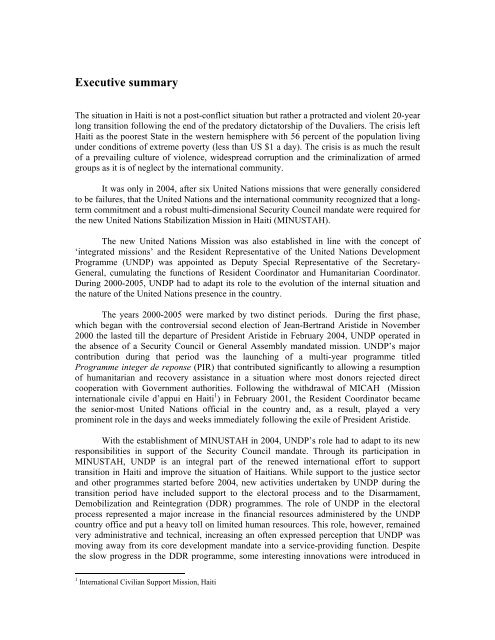case study Haiti - United Nations Development Programme
case study Haiti - United Nations Development Programme
case study Haiti - United Nations Development Programme
Create successful ePaper yourself
Turn your PDF publications into a flip-book with our unique Google optimized e-Paper software.
Executive summary<br />
The situation in <strong>Haiti</strong> is not a post-conflict situation but rather a protracted and violent 20-year<br />
long transition following the end of the predatory dictatorship of the Duvaliers. The crisis left<br />
<strong>Haiti</strong> as the poorest State in the western hemisphere with 56 percent of the population living<br />
under conditions of extreme poverty (less than US $1 a day). The crisis is as much the result<br />
of a prevailing culture of violence, widespread corruption and the criminalization of armed<br />
groups as it is of neglect by the international community.<br />
It was only in 2004, after six <strong>United</strong> <strong>Nations</strong> missions that were generally considered<br />
to be failures, that the <strong>United</strong> <strong>Nations</strong> and the international community recognized that a longterm<br />
commitment and a robust multi-dimensional Security Council mandate were required for<br />
the new <strong>United</strong> <strong>Nations</strong> Stabilization Mission in <strong>Haiti</strong> (MINUSTAH).<br />
The new <strong>United</strong> <strong>Nations</strong> Mission was also established in line with the concept of<br />
‘integrated missions’ and the Resident Representative of the <strong>United</strong> <strong>Nations</strong> <strong>Development</strong><br />
<strong>Programme</strong> (UNDP) was appointed as Deputy Special Representative of the Secretary-<br />
General, cumulating the functions of Resident Coordinator and Humanitarian Coordinator.<br />
During 2000-2005, UNDP had to adapt its role to the evolution of the internal situation and<br />
the nature of the <strong>United</strong> <strong>Nations</strong> presence in the country.<br />
The years 2000-2005 were marked by two distinct periods. During the first phase,<br />
which began with the controversial second election of Jean-Bertrand Aristide in November<br />
2000 the lasted till the departure of President Aristide in February 2004, UNDP operated in<br />
the absence of a Security Council or General Assembly mandated mission. UNDP’s major<br />
contribution during that period was the launching of a multi-year programme titled<br />
<strong>Programme</strong> integer de reponse (PIR) that contributed significantly to allowing a resumption<br />
of humanitarian and recovery assistance in a situation where most donors rejected direct<br />
cooperation with Government authorities. Following the withdrawal of MICAH (Mission<br />
internationale civile d’appui en <strong>Haiti</strong> 1 ) in February 2001, the Resident Coordinator became<br />
the senior-most <strong>United</strong> <strong>Nations</strong> official in the country and, as a result, played a very<br />
prominent role in the days and weeks immediately following the exile of President Aristide.<br />
With the establishment of MINUSTAH in 2004, UNDP’s role had to adapt to its new<br />
responsibilities in support of the Security Council mandate. Through its participation in<br />
MINUSTAH, UNDP is an integral part of the renewed international effort to support<br />
transition in <strong>Haiti</strong> and improve the situation of <strong>Haiti</strong>ans. While support to the justice sector<br />
and other programmes started before 2004, new activities undertaken by UNDP during the<br />
transition period have included support to the electoral process and to the Disarmament,<br />
Demobilization and Reintegration (DDR) programmes. The role of UNDP in the electoral<br />
process represented a major increase in the financial resources administered by the UNDP<br />
country office and put a heavy toll on limited human resources. This role, however, remained<br />
very administrative and technical, increasing an often expressed perception that UNDP was<br />
moving away from its core development mandate into a service-providing function. Despite<br />
the slow progress in the DDR programme, some interesting innovations were introduced in<br />
1 International Civilian Support Mission, <strong>Haiti</strong>

















